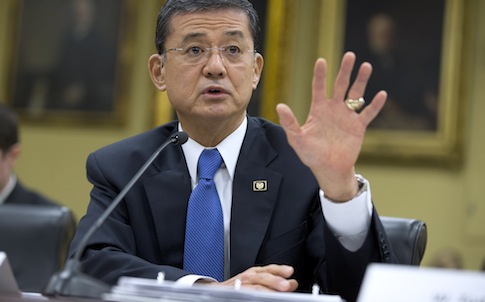The Department of Veterans Affairs (VA) failed to respond to nearly 70 media requests for comment over the past year, leading legislators in Congress to accuse it of stonewalling the public in a new website launched Monday.
The VA Honesty Project, created by the House Veterans’ Affairs Committee, shows scores of instances where the VA public affairs office was either refusing to comment or not addressing the questions that were asked, most of them occurring in 2013.
The site shows the VA refusing to give comment to newspapers and TV affiliate stations across the country, as well as publications such as the Military Times and CNBC.
"Despite the serious issues, the VA’s chief of staff walked away when we tried to ask about the report," CBS Memphis reported in an October 2013 story about negligence at a VA hospital that resulted in three deaths.
"He refused to take any questions about the deaths at his facility and another report News Channel 3 uncovered showing VA center directors were getting bonuses in the millions at the same time their facilities were making deadly mistakes."
In another instance, the VA stonewalled efforts by the Tampa Tribune to investigate the deaths of 19 veterans who died as a result of diagnostic delays.
VA officials declined to comment and told the reporter a Freedom of Information Act request would be required. The VA then denied the subsequent FOIA request.
Delaware Online reported in January of this year that it had been repeatedly stonewalled seeking information about a growing backlog of VA compensation cases in Wilmington.
As previously reported by the Washington Free Beacon, the VA also added a new layer of bureaucratic review before it releases Freedom of Information Act requests, further delaying the process.
KUOW journalist John Ryan first discovered the new policy while investigating the death of a Seattle Army veteran who died at a VA hospital after receiving a lethal dose of morphine. The VA did not comment on his story.
House Veterans’ Affairs Committee chairman Jeff Miller (R., Fla.) said in a statement that the site is dedicated to showing "how VA’s media avoidance strategy is doing the public an extreme disservice while damaging VA’s reputation in the process."
"With 54 full-time public affairs employees, VA’s media avoidance strategy can’t be anything other than intentional," Miller said. "What’s worse, the tactic leaves the impression that department leaders think the same taxpayers who fund the department don’t deserve an explanation of VA’s conduct."
"At the Department of Veterans Affairs, we strive to provide accurate and timely information as we communicate every day with America's veterans, their families, their survivors, and the American people," a spokeswoman for the VA said in a statement to the Free Beacon. "We understand and respect the media's important role, and we work to ensure veterans understand our commitment to provide them the services and benefits they have earned and deserve."
"The public affairs office at VA headquarters responds to thousands of media queries each year, and we continually strive to provide reliable information quickly," the spokeswoman continued. "VA also communicates with hundreds of thousands of veterans and those who care about veterans through many mediums, including social media."
